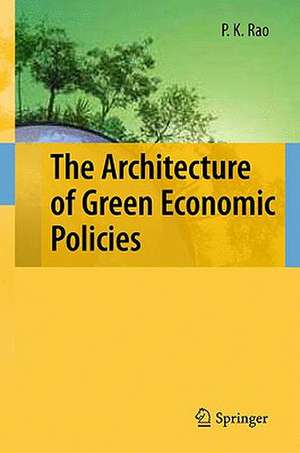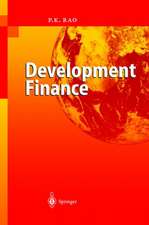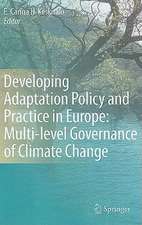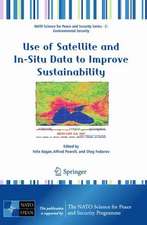The Architecture of Green Economic Policies
Autor P. K. Raoen Limba Engleză Hardback – 5 iul 2010
| Toate formatele și edițiile | Preț | Express |
|---|---|---|
| Paperback (1) | 635.01 lei 6-8 săpt. | |
| Springer Berlin, Heidelberg – 8 noi 2014 | 635.01 lei 6-8 săpt. | |
| Hardback (1) | 641.03 lei 6-8 săpt. | |
| Springer Berlin, Heidelberg – 5 iul 2010 | 641.03 lei 6-8 săpt. |
Preț: 641.03 lei
Preț vechi: 754.15 lei
-15% Nou
Puncte Express: 962
Preț estimativ în valută:
122.67€ • 127.35$ • 102.29£
122.67€ • 127.35$ • 102.29£
Carte tipărită la comandă
Livrare economică 22 martie-05 aprilie
Preluare comenzi: 021 569.72.76
Specificații
ISBN-13: 9783642051074
ISBN-10: 3642051073
Pagini: 340
Ilustrații: XIII, 169 p.
Dimensiuni: 155 x 235 x 20 mm
Greutate: 0.44 kg
Ediția:2010
Editura: Springer Berlin, Heidelberg
Colecția Springer
Locul publicării:Berlin, Heidelberg, Germany
ISBN-10: 3642051073
Pagini: 340
Ilustrații: XIII, 169 p.
Dimensiuni: 155 x 235 x 20 mm
Greutate: 0.44 kg
Ediția:2010
Editura: Springer Berlin, Heidelberg
Colecția Springer
Locul publicării:Berlin, Heidelberg, Germany
Public țintă
ResearchCuprins
Basic Elements of Green Economics.- Analytical Methods of Green Economics.- Formulation of Green Economic Policies: Optimality, Efficiency and Equity.- Institutions and Policy Design.- Reform of Policies of Global Institutions.- Green Economic Policies: Corporate, Local and National Levels.- Green Economic Policies: Regional and Global Levels.- Policy Framework.- Concluding Observations.
Textul de pe ultima copertă
The role of environmental analysis in economic policy making has remained largely limited despite vast literature on environmental economics and governance. An effective integration of economic and environmental sciences with pragmatic design of institutions and policies is still urgently needed for practical use. This book offers a policy framework for economic policies that meaningfully integrate environmental and ecological resource factors. Based on analyses and new insights on sustainable development, this book provides pragmatic approaches for economic policy formulation and implementation, as well as for institutional reform. Thematic aspects include trade and environment, poverty and environment, recognition and accounting of factor limitations beyond traditional economic analyses, and an efficient choice of market and regulatory regimes for effective economic, environmental and social governance.
"It is heartening that an outstanding economist like Prof. P K Rao has written this volume on the Architecture of Green Economic Policies. I believe it is only when economic policies assume a green hue that we would be able to make a dent on the increasing environmental problems that human society and all living species are going to face in the future."
Dr. RK Pachauri, Chairman, Intergovernmental Panel on Climate Change & Director General TERI
"It is heartening that an outstanding economist like Prof. P K Rao has written this volume on the Architecture of Green Economic Policies. I believe it is only when economic policies assume a green hue that we would be able to make a dent on the increasing environmental problems that human society and all living species are going to face in the future."
Dr. RK Pachauri, Chairman, Intergovernmental Panel on Climate Change & Director General TERI
Caracteristici
Designs a pragmatic framework of "green economics" on a firm scientific foundation Analytical bases, policy case studies and operational approaches for economic policy formulation and implementation Coverage of policy and governance issues on local, corporate, national and international level Includes supplementary material: sn.pub/extras





















